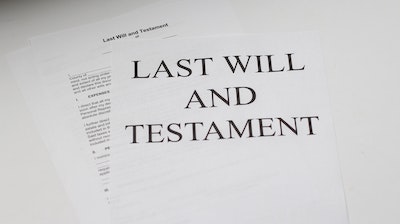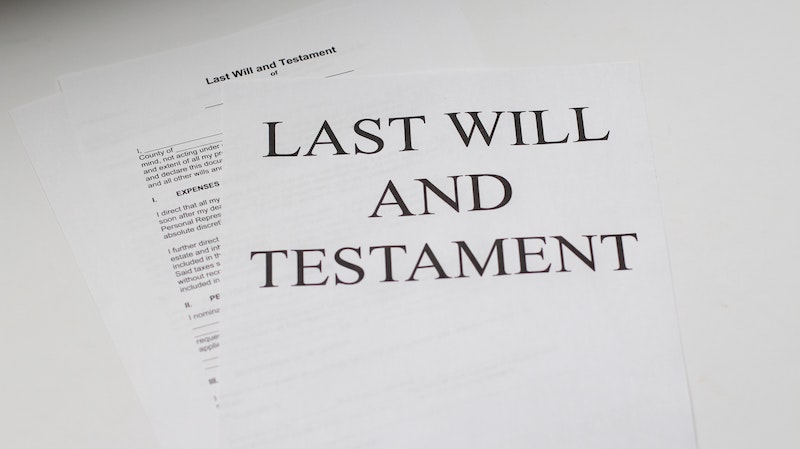Wills vs. Trusts: What is the Difference?
Legal jargon is a challenge to understand for anyone who doesn’t practice law, but it’s important to know what a few terms mean for use in the future. Wills and trusts are both estate planning tools that help protect your assets and pass them on to your heirs in the case of your death. Beyond this basic definition, things get a little more complicated. If you’re wanting to learn more about the difference between these two estate planning tools, keep reading.
What is the difference between a will and a trust? A will is a written document that expresses the deceased person’s wishes and only becomes active after their death. A trust is active the day it is created and there are different types of trusts: irrevocable, living, etc.
Unfortunately, when it comes to money, things can get messy. In the case of a will, it must go through probate – where a court administrator examines it, and family members can contest it. In the case of a trust, they are not required to go through probate and cannot be contested.
This article will examine the differences between wills and trusts, and how each can be beneficial to you and your family in the estate planning process.
What Is a Will?
 A will is a legal document that spells out exactly how you want your affairs handled and assets distributed after your death.
A will is a legal document that spells out exactly how you want your affairs handled and assets distributed after your death.
While there are many helpful sites online that allow you to create your own will, it is preferred that you speak with legal counsel to ensure its validity.
In a will, you can declare how you’d like your affairs handled i.e. your funeral and how you’d like to be taken care of in the case of an accident.
Though no one wants to prepare for a medical emergency, many people will include what they’d like to happen. This includes things such as a DNR (do not resuscitate), how long they may remain on life support, who should make decisions, etc.
Many individuals will also include specific things they’d like to be included in their funeral – where it should be, who should come, if they’d like to be buried or cremated, etc. Most often, a will includes a list of assets and debts, property, vehicles, contents of safety deposit boxes, and family heirlooms. Any of these possessions can be left to family, friends, or charities – it is up to you where you’d like them to go.
A will is the only way that you can disinherit children or a spouse. Each has a statutory right to inherit, but if you wish, you can disinherit them in the will. There are rules to how much can be disinherited and different states have different laws governing disinheritance – talking to a lawyer can help you understand this process.
Understanding Probate
It is important to note that all wills must go through probate court and will be made public record. Probate lawyers can be expensive, especially if the will becomes contested. Also, any retirement accounts and life insurance policies will pass directly to the named beneficiaries and cannot be contested and will not go through the probate process.
Create a Will
Want to make a will and ensure that your final wishes are carried out. Click here to create your will online right now!
Types of Wills
The most commonly used type of will is a testamentary will – which is the kind we just talked about. Other, less commonly used wills include: holographic wills, oral wills, and pour-over wills.
Holographic Will
A handwritten, testator signed document which is an alternative to a will produced by a lawyer. Some states do not recognize holographic wills, so be sure to research before choosing this method. Most states require certain aspects in order for a holographic will to be considered valid: the testator wrote the will, was mentally capable of writing the will, and it contains their wish to disburse personal property.
Oral Will
Just as it sounds, a will made verbally to others with the intent that their wishes will be carried out after death. Most states will not recognize oral wills as valid, but a witness to the oral will may try to come forward with the instructions and try to probate it.
Pour-Over Will
A legal document ensuring an individual’s remaining assets will be transferred to a previously established trust after their death. This type of will works in conjunction with a trust and provides a way to avoid the probate process. Any assets set up in a trust will go directly to the beneficiaries as wished by the grantor before their death.
What Is a Trust?
According the legal experts at Gary Crews Law, a trust is a fiduciary relationship where you give another party authority to handle your assets for the benefit of your beneficiaries. There are many different reasons an individual may choose to use a trust and they can be created for a variety of different functions.
Trusts are different from wills in that they stay private and do not go through probate. This can prevent any conflict between your beneficiaries as they will not be able to contests the terms of the trust.
In order for trusts to be valid, they must expressly identify: the trustor, the trustee, the successor trustee (in the event of illness, death, or incapacity of the trustee), and the trust beneficiaries. Your trust will become active the day you sign it and can be more costly to create and maintain than a will – however, keeping your heirs out of probate court could be worth it.
Types of Trusts
There are two categories of trusts: testamentary and revocable living. Under these two categories, the trust can be created for a variety of functions.
Living Trust
A trust will require you to transfer property to loved ones after death and it is considered living because it is created while the trustor (property owner) is alive. The revocable part of the term means that it may be changed during the life of the trustor, who maintains ownership of the property while they are alive. The trust will become operational at the trustor’s death and will not pass through probate court – property will be passed immediately to your named beneficiaries.
Testamentary Trust
A trustee will be named in the document and this person has the authority and will be responsible for the asset’s distribution as decalred by the trustor. The trustee can be an individual or a firm that will hold the property and assets administers anything as directed by the trustor.
Many people may connect “trust” to the term “trust fund.” These two terms are basically the same thing – each allowing a beneficiary to receive certain assets at a specific time whether the trustee is alive or has passed.
Choosing a Will vs. a Trust
There are many advantages and disadvantages to choosing a will and/or a trust. When deciding what is best for you, consider seeking advice from legal counsel. While you can create your own will, speaking with an estate planning attorney can help you choose the best course of action for your personal circumstances.
Things to consider when choosing one over the other, or both – your beneficiaries or heirs. Unfortunately, money can cause people to do crazy things and will contesting is more common than you might think. A trust allows your heirs to avoid having to pay probate fees and prevents them from fighting over the wishes of a will – though they may still argue over the terms, they cannot change any of them.
Many people will choose to create both a will and a trust. The will allows for your wishes of a funeral or medical terms to be clear and the trust will remain private, avoid probate court, and pass assets directly to the beneficiaries.
Related Questions
How Much Does it Cost to Create a Will?
Even though no one wants to plan for their death, creating a will is an important part of the estate planning process. Though you can go online and create your own will, it is highly encouraged to go to a professional – this helps ensure the validity of your wishes will pass muster in court.
You can expect to pay anywhere between $300 and $1000 to hire a lawyer to draft your will. Much of it depends on the complexities of your wishes and the size of your estate. A larger estate will take more time to create as the value of assets must be listed and confirmed.
Though this is a wide range in price, it is worth it to both you and your beneficiaries.
How Much Does it Cost to Create a Trust?
Trusts are more expensive than wills to create because they are often more complex and must be maintained throughout the trustor’s lifetime. You can probably expect to pay between $1000 and $2500 to set up a trust. This range will vary depending on where you live and the complexity of the terms.
If you set up a trust early on, the maintenance could cost you more as your acquire new assets, change any beneficiaries, etc.








